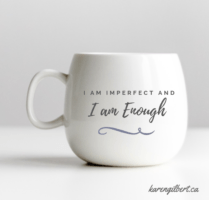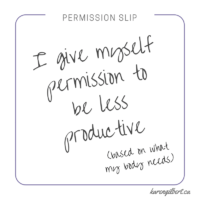3 Ways to Lighten Your Mental Load
In our modern, information-flooded world, feeling mentally overloaded and pressed for time and energy has become a state of being for many. We often don’t pause long enough to even ponder how we are using our precious emotional and intellectual resources, and might be surprised at what we would find if we did.
Imagine you are going on a trip. You have carefully packed the necessities in your backpack but as you travel, the bag begins to feel heavy. You take a rest, but it doesn’t change to how you feel. So you open up the backpack, only to discover that at the bottom of your pack are a bunch of rocks! You’ve been carrying around extra load the entire way.
What would any sensible person do at this point? You would take out the rocks, right?
This is obviously easier to do with actual rocks than what we carry in our minds and bodies as human beings (i.e. self-doubt, desire for approval, self-criticism, fears, perfectionism or shame). We all have some rocks at the bottom of our bag, and exploring ours with curiosity gives us the option to begin to let go of what is no longer serving us.
There are many effective ways to lessen your mental load. We can’t escape difficult emotions and experiences in life, but we can learn new ways of coping to reduce the frequency, intensity and duration of the impact they have on our lives.
Here are 3 approaches you may not have tried that I have found to be helpful for the people I work with.
Lay down the burden of striving
Doesn’t your metaphorical backpack feel lighter just hearing that phrase? Striving has its place, but it doesn’t have to be so burdensome.
Brené Brown , research professor and author who studies vulnerability, worthiness, courage and shame, uses the term “healthy striving” to describe our efforts towards things that really matter to us. When we are driven instead by “what will people think?”, we end up “hustling for worthiness”. We please and perfect in an attempt to impress others, fit in, and avoid criticism. And it is mentally exhausting!
, research professor and author who studies vulnerability, worthiness, courage and shame, uses the term “healthy striving” to describe our efforts towards things that really matter to us. When we are driven instead by “what will people think?”, we end up “hustling for worthiness”. We please and perfect in an attempt to impress others, fit in, and avoid criticism. And it is mentally exhausting!
We often attempt to lessen mental burdens by avoiding or numbing our emotions. We surf the internet, incessantly plan or worry, or use food, alcohol, or any number of other vices to take the edge off.
But here’s the rub – you can’t numb hard emotions without also numbing the good ones!
When we let go of “supposed to” and defining our worth by our achievements, we begin to tune into our own voice, honour our needs, and own our authenticity. We recognize when there is more hustle than health in our striving.
Get clear on your values
![]()
![]() Your core values are ways of being and believing that are most important to you. They identify what leads you to feeling most fulfilled, alive and fully YOU. When we are confident that our efforts are aligned with what matters most to us, we are less likely to fall into patterns of rumination, self-doubt and self-criticism. We are
Your core values are ways of being and believing that are most important to you. They identify what leads you to feeling most fulfilled, alive and fully YOU. When we are confident that our efforts are aligned with what matters most to us, we are less likely to fall into patterns of rumination, self-doubt and self-criticism. We are  better able to navigate inevitable mistakes and missteps.
better able to navigate inevitable mistakes and missteps.
Values are a key component of many evidence-based behaviour change methods, and there are various techniques to tap into your own. In my experience, looking to your lived experiences is a fast track to what you value. By identifying times you felt deeply fulfilled, you will see patterns in the elements that were present. You create a touchstone you can come back to time and again. ⠀
Practice self-compassion
Many of us use self-criticism as a motivator when we are struggling. We tell ourselves “pull up your bootstraps, try harder”, but our nervous system perceives our thoughts as an internal threat.
The fight-flight-freeze stress response is triggered, and this survival mechanism turned inwards equates to self-criticism (fight), isolation (flight), and rumination (freeze). As a result, the system that is designed to keep us safe ends up causing us suffering!
Kristin Neff and Chris Germer’s research on self-compassion shows that speaking to ourselves in a nurturing, supportive manner, like a best friend or dearest aunt, releases oxytocin and creates feelings of calm, safety, and trust. Consequently, we can think more clearly, problem-solve, and find much needed perspective.
Self-compassion studies have shown reduced anxiety, depression, perfectionism, shame, rumination, and fear of failure, as well as increased life satisfaction, self-confidence, optimism, gratitude, connected relationships, and better coping with chronic health conditions.
If self-compassion was a vitamin, we would all be taking it every morning!
Getting started: tools to lighten your mental load
You may recognize that you too have some rocks in your bag that are draining your mental energy. Choose one of the action steps below. Try it on for a week or two. Notice what resonates and add on another practice when you feel ready.
1. Write yourself a permission slip
 One of the many tools from Brené Brown’s research that have a significant impact on people’s lives is writing permission slips. It’s a quick way to check-in with your own needs, and practice self-care and self-compassion.
One of the many tools from Brené Brown’s research that have a significant impact on people’s lives is writing permission slips. It’s a quick way to check-in with your own needs, and practice self-care and self-compassion.
When you are feeling overloaded, use a sticky note and write yourself permission for what you need. Permission to lay down the burden of striving, to ask for help, to receive help, to be silly and uncool, to cry, or to feel exhilarating joy. Permission to be imperfect and enough.
2. Make a values list
Think of an experience that was so positive, fulfilling, and deeply meaningful that you can almost feel what it was like to be in that moment. It could be from any point in your life. Write down what made that experience so meaningful to you. Repeat this process a few times using different experiences.⠀⠀⠀⠀⠀⠀
⠀⠀⠀⠀⠀⠀⠀⠀
For each experience, ask yourself, what would a person value who found this so fulfilling? Freedom? Connection? Adventure? Learning? Notice if there are words that come up multiple times. Pare your list down to 3-5 values that resonate most deeply and refer to it often.⠀⠀⠀⠀⠀⠀⠀⠀⠀⠀⠀⠀⠀⠀
3. Listen to the self-compassion break
Walk through the three steps of the self-compassion break the next time you are overwhelmed, available in audio at Center For Mindful Self-Compassion:
 Mindfulness or recognizing that we are struggling or hurting (“This is really hard”).
Mindfulness or recognizing that we are struggling or hurting (“This is really hard”).- Common humanity or connecting with the reality that struggle is a part of being human. We are not alone in our suffering (“Others also feel this overloaded”).
- Self-kindness or expressing a phrase that allows our heart to rest (“May I connect with my goodness”, “May I feel at ease”).
Beginning to practice self-compassion can feel like wearing a shirt that doesn’t fit at first, but keep taking “Vitamin SC”, even if it feels awkward.
We are more likely to put our energy towards what truly matters to us when we have tools in our resilience toolkit that reduce mental overwhelm, honour our imperfect humanness, and build our confidence to navigate through struggle with our worthiness intact.
What are your favourite tools for lightening your mental load? Leave a comment below or get in touch if you have any questions.
Here’s to healthy striving, lightening your mental load, and carrying what serves you !
About Karen Gilbert
 Karen Gilbert is a Vancouver-based Occupational Therapist who helps people juggling a busy life and an invisible health condition develop new strategies and habits for living life with greater ease. She is a Certified Daring Way™ Facilitator and leads Daring Greatly™ and Rising Strong™ groups based on Brené Brown’s research on vulnerability, courage, shame, and worthiness. Visit her website to sign-up for updates on upcoming groups. You can also find her on Instagram, Twitter and Facebook.
Karen Gilbert is a Vancouver-based Occupational Therapist who helps people juggling a busy life and an invisible health condition develop new strategies and habits for living life with greater ease. She is a Certified Daring Way™ Facilitator and leads Daring Greatly™ and Rising Strong™ groups based on Brené Brown’s research on vulnerability, courage, shame, and worthiness. Visit her website to sign-up for updates on upcoming groups. You can also find her on Instagram, Twitter and Facebook.
If you live near Vancouver, are currently living with or understand the experience of living with a health condition, and want to refresh your resilience toolkit, Rising Strong™ for Health is coming up in February 2020! Based on the research of Brené Brown, participants will receive individual support to identify core values, put permission slips into practice, and walk through the reckoning, rumble, and revolution of Rising Strong™ with a small group. You will learn a process for writing new endings to your stories of struggle. This practice is a helpful tool for reducing mental load and the time and energy expended on the “rocks in our backpacks” that lead to rumination, numbing or avoidance. There are only 6 spaces available so if you are interested , sign-up early to take part in this weekend workshop.
References
Brown, B. (2010). The gifts of imperfection: Let go of who you think you’re supposed to be and embrace who you are. Center City, Minn.: Hazelden.
Brown, C. B. (2012). Daring Greatly: how the courage to be vulnerable transforms the way we live, love, parent, and lead. New York, NY: Gotham Books.
Brown, B. (2015). Rising Strong. First Edition. New York: Spiegel & Grau.
Center For Mindful Self-Compassion (2017). Home. [online] Available at https://centerformsc.org/
